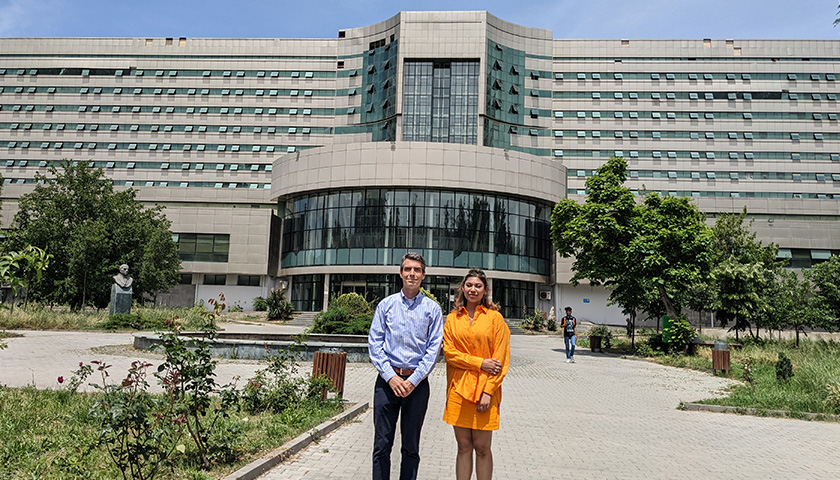The Health of A Nation

One of the main tenets of the Hippocratic Oath invokes healers to pledge, “I will abstain from all intentional wrongdoing and harm.” This concept is so critical that young doctors learn it as “First, do no harm.”
Hospitals have a multitude of ways they help keep patients safe: Take vital signs correctly and at regular intervals. Use electronic ordering and dispensing to ensure a patient receives the correct medicine. Make sure patients don’t fall.
The modern focus on preventing patient harm grew in part from work by the Boston-based Institute for Healthcare Improvement (IHI), which was founded in 1991. Because of the IHI’s “science of improvement” approach, the mantra of reducing patient harm is now ingrained in hospital culture around the world.
But not everywhere.
That’s something Healthcare Administration Professor Peter Martelli learned about Georgia, a country on the Black Sea abutting Russia and Turkey. During a 2018 visit to Suffolk by physician executives from former Soviet states, Martelli presented some of his work on organizational reliability, using patient safety examples to illustrate how “doing no harm” requires system-level improvements.
Martelli recalls that after the presentation, one of the doctors from Georgia approached him and said how desperately such improvements were needed there. “‘What you presented: we need that desperately. We’ve been working on it and getting nowhere,’” the doctor said. “‘Can you come next month?’”
After many Zoom meetings to start the collaboration, Martelli finally made it to Georgia on a Fulbright US Scholar grant—one of several Sawyer Business School faculty who’ve recently been awarded Fulbright scholarships. And on his most recent trip, he asked one of his Healthcare Administration graduate students, Shagorika Dé, Class of 2024, to join him. Dé received her MD in Armenia, which borders Georgia to the south, and is very familiar with the challenges of post-Soviet medicine.
“Since Georgia is an ex-USSR nation, their healthcare is not the best—to put it softly,” Dé says.
Inside Knowledge
While in Georgia, Martelli and Dé toured hospitals and universities, met with diplomats and healthcare professionals, sponsored professional events, and started to explore the many issues around patient safety in the Georgian healthcare system. It’s not just that there is little to no data to benchmark the status of patient safety and improve it. According to Martelli, the real problem is that the system lacks motivation to change.
“The will to act comes from professional obligations, which has to be baked into the whole culture,” he says. “That’s why the goal is not only to attack the process of data collection and sharing, but to build up a profession that takes the issue seriously.” Martelli likens the current Georgian approach to patient harm as a regulatory game of cat-and-mouse.
“The problem of approaching patient safety that way is that you’ll never improve the system. It’s nobody’s fault, it’s everyone’s,” says Martelli. “There’s not just one bad apple, it’s a bad barrel. The system itself is producing and reproducing this bad behavior.”
The good news is that Georgia doesn’t need to start from scratch. America ventured down this path back in the 1990s—thanks in part to the work of the IHI—so the road map is there.
“It’s like going back and watching the film again,” says Martelli. Using what he’d learned as a doctoral student at the Center for Catastrophic Risk Management at UC-Berkeley, he’s trying to apply a framework that can help change the mindset of the people on the ground. “I want to create a profession around quality and safety so that there are people who can reproduce the approach and the attitude.”
It’s still early days for Martelli and Dé, but they’re continuing to build the momentum of their work from Boston. This May, Martelli will return to Georgia with Professor Gino Canella from the journalism department at Emerson, with the goal of collecting stories of dealing with patient harm.
While it’s hard to change a culture, Martelli and Dé are optimistic they can make a difference.
“I do not feel helpless at all,” says Dé. “I know there is a problem, but I can see the opportunity that they can do this better.”

Contact
Greg Gatlin
Office of Public Affairs
617-573-8428
Ben Hall
Office of Public Affairs
617-573-8092



